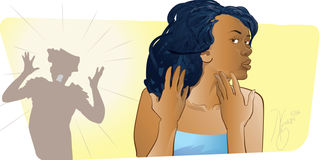Premium
Why do some women grow beards?

Why some women grow beards
What you need to know:
- A woman with increasing hair in the wrong places should not take it lightly.
Should a woman be worried if she has a beard? That was the question Sara was struggling to answer when she came to the Sexology Clinic. Her mother-in-law’s interpretation of female beards worried her.
“She has called me evil just because I have beards,” Sara explained, “I used to have few strings of hair but I have noted an increase in recent years which made my mother-in-law notice them,” she added.
Surprisingly, Sara’s mother-in-law advised her son not to be intimate with her. According to her, a bearded woman carries bad omen that can lead to misfortune and even death of their sex partner.
The main reason Sara came to the clinic for consultation, therefore, was to have a solution to rid of the hair permanently. She wanted peace of mind and getting rid of the hair was paramount.
Sara was 35 and was married to Paul who was 36. The couple had been in marriage for seven years but did not have a child. She had failed to conceive even without using contraceptives.
“But getting a baby is not the main issue for now doctor,” she explained, “I need to be intimate with my husband and I have used hair-removing creams, shaving machines and wax and the more I get aggressive with the hair, the more it increases,” she said.
As a result, the skin around her chin had become dark, mimicking that of a man who cuts beards frequently. She had also developed ugly pimples on her face which she attributed to her monthly periods which had increasingly become irregular.
“But above all, I do not want problems with my mother-in-law,” she continued.
Naturally, 40 percent of women have a few scattered and light-coloured hair around the chin, maybe an isolated one on the cheek and sometimes another on the chest. Some families may be more predisposed to this than others due to genetic reasons. Such hair may not cause concern because they are rarely visible.
What causes concern is if a woman suddenly grows a lot of hair in places where only men have hair. Excessive hair growth is called hirsutism and a woman starts to follow a male pattern of hair growth leading to the development of a beard, moustache, chest hair, pubic hair that grows upwards towards the navel and a general increase of hair on the arms and legs.
A woman with increasing hair in the wrong places should not take it lightly as this may signal a number of conditions. The underlying problem may be high levels of male hormones (androgens) in a woman.
In other instances, the hormones may be normal but the body is responding abnormally to them, that is, the woman is hypersensitive to androgens. Other than androgens, many other hormones, e.g. insulin, cortisol and prolactin could be on the rise causing the problem.
Other than abnormal growth of hair, androgens cause acne (pimples), may deepen the woman’s voice, and may cause scalp hair to fall off leading to balding.
Hormone abnormalities that cause hirsutism interfere with female sexual function and affected women may fail to get sexual stimulation and orgasm. There may be an effect on fertility too and the woman may fail to conceive.
“Oops, that sounds scary,” Sara interrupted, “don’t tell me that my pimples and failure to conceive for seven years could be associated with the beards!”
Based on the affected hormones and resulting symptoms, a number of conditions are coined which could be signalled by hirsutism. The commonest of these is polycystic ovary disease which, in addition to hirsutism, is characterised by irregular periods, obesity and infertility. When ultrasound is done, the ovaries of affected women have small multiple bags of fluid called cysts.
In cases where cortisol is the predominant hormonal problem, the disease is called Cushings syndrome. Other than causing hirsutism, people with this disease grow fat only in the trunk of the body, their legs remaining thin.
In some cases, hirsutism may be the first sign of a tumour, and a growth in some body organ which could even be cancerous. The growth produces hormones that disorganise the body and cause hirsutism. The growth could be in the ovary or in the adrenal glands.
Medicines taken to treat other disease conditions sometimes cause hirsutism. Such medicine either mimics a hormone, causing its increased release or sensitisation of the body to be more responsive to one of the hormones.
After a number of tests, I found Sara to have polycystic ovary disease. Treatment was directed at correcting the imbalance of hormones which ultimately led to the disappearance of her hirsutism and acne. She also eventually conceived.




